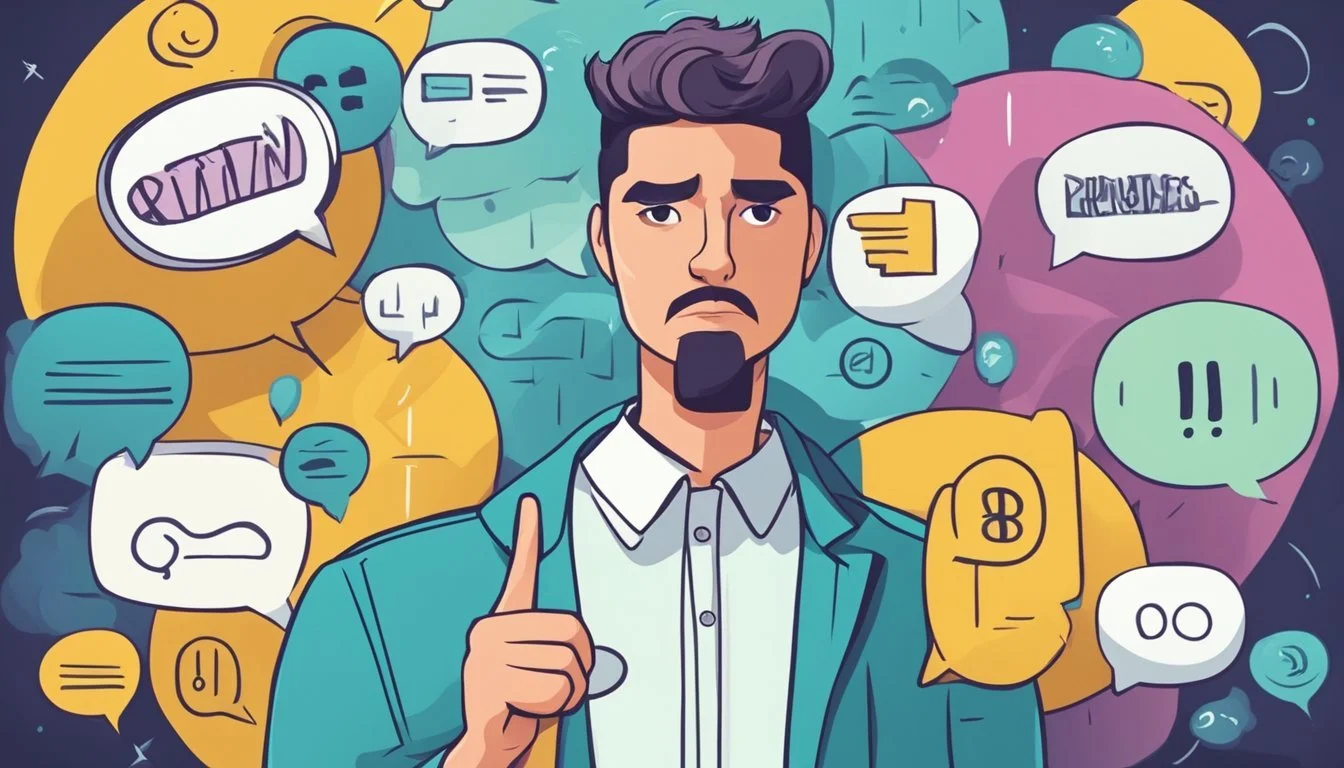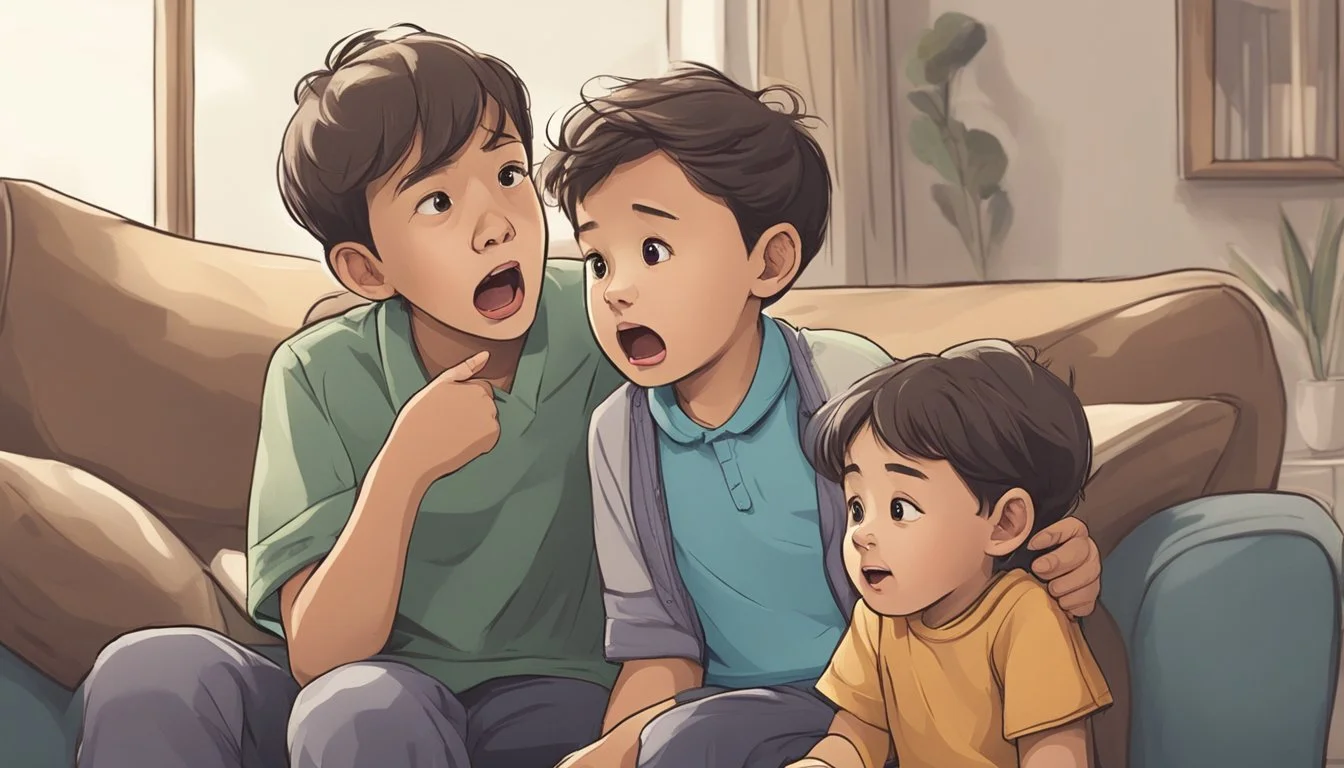14 Characteristics of Emotionally Abusive Siblings
Key Traits Explained
Siblings are often seen as lifelong companions, but not all sibling relationships are healthy. Emotional abuse within sibling relationships can be as damaging as other forms of abuse but often goes unnoticed or unaddressed. Recognizing the signs of emotional abuse by a sibling is crucial for identifying and addressing harmful behaviors.
What are the telling signs that indicate a sibling may be emotionally abusive? This article explores the characteristics and behaviors that define emotional abuse in sibling relationships. By understanding these signs, individuals can take steps to protect themselves and address toxic dynamics within their families.
1) Constantly Criticizing
Constant criticism from a sibling can have a profoundly negative impact on an individual's self-esteem and mental health. This behavior often includes putting down their sibling's achievements, appearance, or abilities. The abuser may employ harsh language to belittle or mock their sibling, eroding their confidence over time.
Criticism is not limited to major life events or actions. Siblings who are emotionally abusive frequently find fault in everyday behaviors and minor mistakes. This persistent negativity can make the victim feel inadequate and perpetuate feelings of worthlessness.
In many cases, the criticizer may cloak their comments as "constructive feedback." However, the true intent is to dominate or control the sibling. This manipulation becomes a form of psychological torment, leaving the victim constantly second-guessing themselves.
Emotionally abusive siblings may also compare their target unfavorably to others, fueling feelings of jealousy and inadequacy. By doing so, they reinforce their superior position within the family dynamic and diminish the victim’s self-worth. This constant barrage of negativity can lead to long-term emotional scars.
For more information, the impact of sibling bullying is well-documented.
2) Name-Calling
Name-calling is a common form of emotional abuse among siblings. It involves using degrading, insulting, or derogatory terms to belittle a sibling.
This behavior can severely impact self-esteem and emotional well-being. Over time, it creates a toxic environment where the victim feels unvalued and perpetually attacked.
Victims of name-calling may start to internalize these negative labels, leading to long-term psychological issues. Frequent exposure to such abuse can result in anxiety, depression, and a sense of worthlessness.
Research indicates that such psychological mistreatment can be just as damaging as physical abuse. Repeated exposure to negative terms not only harms the sibling relationship but also affects the victim's mental health significantly.
Effective strategies to handle name-calling include setting clear boundaries and seeking support from parents or guardians. Addressing the abusive behavior early can prevent long-term psychological harm and foster a healthier sibling relationship.
For more about the emotional impacts of name-calling, refer to this discussion on sibling bullying and abuse.
3) Blaming Others For Their Own Problems
Emotionally abusive siblings often deflect responsibility for their own issues. They tend to blame family members or external circumstances for situations that arise from their own actions.
For example, an abusive sibling might refuse to acknowledge their poor behavior and instead point fingers at others, creating a divisive atmosphere. This tactic can erode trust and build resentment within the family.
This behavior pattern is commonly seen in toxic sibling dynamics. According to experts, siblings who consistently blame others avoid personal accountability, making it difficult for healthy communication and resolution of conflicts.
Such siblings might constantly highlight the shortcomings of others, subtly or overtly, to mask their own flaws. This manipulation strains relationships and fosters an environment where the victim feels constantly undermined.
In severe cases, the victim can become isolated, believing they are the source of all problems. This lasting impact can be particularly harmful, as it diminishes the victim's self-esteem and mental well-being over time.
Identifying this behavior is crucial for addressing the root causes and restoring healthier family interactions. Recognizing the signs early can help mitigate the negative effects of such toxic dynamics.
4) Isolation From Friends and Family
Emotionally abusive siblings may isolate their victims from friends and family. This tactic helps the abuser maintain control and prevent others from detecting the abuse.
The abuser might belittle the victim's relationships, making them feel guilty for wanting to spend time with others. Over time, the victim may feel pressured to avoid friends and family altogether.
Frequent interference in their social interactions can cause the victim to become dependent on the abuser. This isolation exacerbates feelings of loneliness and helplessness.
The abuser may also manipulate family dynamics, turning other relatives against the victim. This further isolates the victim and entrenches the abusive sibling’s control.
For more detailed information, visit Warning Signs of Isolation and Emotional Abuse.
5) Frequent Tantrums
Frequent tantrums are a common characteristic of emotionally abusive siblings. These outbursts can often be intense and unpredictable, creating an environment of fear for the victim. The abuser uses tantrums as a way to assert control and manipulate the dynamics within the family.
Tantrums in this context are not typical childhood behaviors. They are deliberate and calculated, meant to intimidate or punish the sibling. These outbursts can involve yelling, screaming, and even physical aggression, leaving the victim feeling helpless and afraid.
The emotional impact of these frequent tantrums is profound. Victims may develop anxiety and a constant sense of unease, never knowing when the next outburst will occur. This constant state of alertness can lead to long-term emotional and psychological issues.
Frequent tantrums also serve to isolate the victim. Other family members might prioritize calming the abuser to avoid conflict, thus inadvertently neglecting the needs and well-being of the victim. This neglect can exacerbate feelings of loneliness and worthlessness.
Addressing the issue of frequent tantrums requires acknowledging the behavior as abusive. Families must understand that these actions are harmful and take appropriate steps to provide support and intervention for the victim.
6) Manipulating Emotions
Emotionally abusive siblings often manipulate emotions to exert control. This manipulation might include guilt-tripping, where they make the victim feel responsible for their unhappiness.
They may also use tactics like playing the victim. This involves dramatizing situations to garner sympathy and shift blame onto the victim. This tactic can make the victim feel compelled to fix problems they didn't create.
Shaming and belittling are other common techniques. Abusive siblings might insult or undermine the victim’s confidence, making them feel worthless or inadequate. These actions can lead to long-term emotional damage.
In some cases, abusive siblings isolate the victim from others. They may spread false accusations or provoke the victim into actions that make them look bad, causing others to distance themselves.
Emotional manipulation can also appear in the form of scapegoating. Here, siblings blame the victim for things that go wrong, even when the victim is not at fault. This continuously places the victim in a defensive position.
Understanding these tactics is crucial for recognizing and addressing sibling abuse. Being aware of these behaviors can help victims seek appropriate support and interventions.
More information about emotional manipulation tactics can be found in articles like Family Manipulation on Healthline.
Recognizing emotional abuse in sibling relationships is vital for safeguarding mental well-being.
7) Intimidation through Threats
Emotionally abusive siblings often use threats to assert control and power over their targets. These threats can be explicitly stated, such as threats of physical harm, or more subtle, like threats to expose secrets or damage relationships.
The goal is to create an environment of fear and anxiety. By doing so, the abusive sibling ensures compliance and minimizes resistance from the victim.
In many cases, these threats are designed to isolate the victim. For example, the abuser might threaten to tell lies to parents or friends, causing the victim to feel trapped and alone.
Such threats not only affect the immediate emotional well-being of the victim but can also have long-term psychological impacts. Feelings of helplessness and fear can persist well into adulthood.
Understanding the dynamics of intimidation through threats is crucial for identifying and addressing emotionally abusive behavior between siblings. Recognizing this pattern can be the first step in seeking help and support.
For more information on emotional abuse tactics, you can refer to this resource on sibling bullying and abuse.
8) Belittling Achievements
Emotionally abusive siblings often diminish or undermine each other's accomplishments. This behavior aims to make the targeted sibling feel their successes are insignificant or unworthy of recognition.
Belittling achievements can take various forms. An abusive sibling might downplay accomplishments by calling them "lucky" or "no big deal." They might also compare the sibling’s success unfavorably to their own or to someone else's.
This type of behavior can severely affect the victim’s self-esteem. Consistently facing such negativity can discourage the victim from celebrating their achievements or pursuing new goals. The unequal dynamic where one sibling always feels less competent or valuable can harm their personal growth.
These actions can create a toxic environment. For example, when the victim shares good news, the abusive sibling might respond with sarcasm or dismissive comments like, "Anyone could do that." These subtle, yet cutting, remarks can be just as damaging as outright insults.
If these patterns persist, they can embed long-term issues into adult relationships. The victim might struggle with confidence or feel inadequate in professional situations, stemming from years of belittlement within the family.
Addressing this behavior is crucial. Recognizing the impact of belittling achievements can help both the victim and the abuser understand the need for healthier communication and respect in their relationship. For more on sibling bullying, read Sibling Bullying and Abuse: The Hidden Epidemic.
9) Making You Feel Worthless
Emotionally abusive siblings often engage in behaviors that make the victim feel worthless. This can include constant belittling and name-calling. They might frequently insult the victim’s intelligence or abilities.
These abusive siblings may undermine the victim’s achievements. When the victim accomplishes something, the abuser might dismiss it as insignificant. This consistent devaluation can erode the victim’s self-esteem.
In some cases, the abuser engages in targeted actions such as shaming or humiliating the victim in front of others. This serves to embarrass the victim and further reinforce feelings of worthlessness. It also makes the victim feel isolated.
Emotionally abusive siblings may use false accusations as a tool. By constantly accusing the victim of things they didn’t do, the victim starts to feel responsible for the abuser’s negative behavior.
Victims may also be subjected to threats and intimidation. These methods are used to control and manipulate the victim into feeling powerless. Over time, this consistent manipulation can make the victim feel insignificant and unimportant.
Additionally, relational aggression, such as spreading rumors or gossip about the victim, can further damage their self-worth. This form of social sabotage isolates the victim and makes them feel unvalued among peers. The goal is to create doubt within the victim’s mind regarding their own worth and capabilities.
10) Creating Unreasonable Expectations
Emotionally abusive siblings may create unreasonable expectations for their siblings. They set standards that are nearly impossible to meet, fostering a sense of failure and inadequacy.
This form of emotional abuse can manifest in various ways, such as expecting perfect grades or demanding total compliance with arbitrary rules. These expectations are often enforced with harsh criticism and constant reminders.
Such high demands can lead to chronic stress and anxiety for the targeted sibling. This type of pressure may cause the sibling to feel they can never measure up, damaging their self-esteem.
Expectations may also be set around social behavior and personal achievements. The abusive sibling might insist on certain social interactions or specific accomplishments, disregarding the individual's own goals and desires.
This abuse tactic often aims to assert dominance and control, making the targeted sibling feel helpless and trapped. Creating these unrealistic standards is a method to undermine the sibling's confidence, leading to long-term emotional harm.
11) Jealousy Over Your Success
Emotionally abusive siblings often display jealousy when you achieve success. This behavior can manifest in various ways, such as minimizing your accomplishments or pretending they are not significant.
They might avoid talking about your success altogether. When they do acknowledge it, they might undermine it by making snide remarks or pointing out flaws.
This constant negativity can leave you feeling demoralized and reluctant to share future achievements. Such siblings may also try to shift attention back to themselves, emphasizing their own abilities or accomplishments to overshadow yours.
In some cases, they might even start unnecessary arguments or create conflict to divert attention from your successes. This serves to keep the focus away from your achievements and maintain their perceived superiority.
Dealing with this toxic environment can be challenging. Constructive communication and setting firm boundaries are critical steps toward mitigating the impact of their jealousy.
12) Spreading Rumors About You
Emotionally abusive siblings often engage in rumor spreading to manipulate perceptions. They may invent stories about their sibling to damage their reputation or relationships. This tactic is a way to control and isolate the victim by turning family or friends against them.
Spreading false information can have long-lasting effects. It sows seeds of doubt and mistrust among peers and family members. This form of belittling can make the victim feel isolated and unsupported.
The abuser enjoys watching the fallout from the rumors. Observing strained relationships and the emotional distress caused to the victim gives them a sense of power. This manipulation hinders the victim's mental well-being and social standing.
Rumor spreading is a covert form of control. It allows the abuser to attack without direct confrontation. The victim may find it challenging to defend themselves against such insidious tactics.
13) Withholding Affection
Withholding affection is a common tactic used by emotionally abusive siblings. It involves deliberately ignoring or withdrawing emotional support, hugs, or any form of positive reinforcement.
These siblings often use this tactic to manipulate or control the emotions and behaviors of their siblings. By withholding affection, they create a sense of insecurity and inadequacy.
This form of emotional abuse can lead to long-term damage, making the victim feel unloved and unworthy. The affected sibling may struggle with self-esteem and trust issues well into adulthood.
This can be particularly damaging in formative years, as children rely heavily on familial affection for emotional development. The absence of this affection can hinder their emotional growth and stability.
In some cases, withholding affection may escalate to other forms of emotional abuse, such as gaslighting or stonewalling. Recognizing this behavior early can help in addressing it and seeking appropriate support.
14) Using Guilt to Control
Emotionally abusive siblings often resort to guilt-tripping as a powerful control tactic. By leveraging feelings of guilt, they can manipulate their sibling’s actions and emotions.
For instance, they might remind their sibling of past sacrifices they’ve made, implying that the sibling owes them. This can lead to a powerful sense of obligation.
Additionally, they can play the victim, making the sibling feel responsible for their happiness or well-being.
This emotional burden can cause the sibling to comply with unreasonable demands, fearing that not doing so will result in feelings of guilt and responsibility for any negative outcomes.
Using guilt in this way creates a cycle of manipulation and compliance that is difficult to break. This tactic ensures that the abuser maintains control, further entrenching unhealthy dynamics within the sibling relationship.
Understanding Emotional Abuse in Sibling Relationships
Emotional abuse in sibling relationships often remains hidden, leading to long-term psychological impacts. This requires a detailed examination of its definitions and specific characteristics.
Defining Emotional Abuse
Emotional abuse between siblings involves behaviors that demean, belittle, or induce fear. These actions include name-calling, insults, humiliation, and constant criticism. Unlike physical abuse, emotional abuse doesn't leave visible scars, making it harder to recognize. Often, the abuser manipulates emotions to gain control over the sibling.
This type of abuse creates an environment where the victim feels worthless and isolated. It can cause lasting damage to a child's self-esteem and emotional well-being. Identifying emotional abuse is crucial as it is often dismissed as "normal sibling rivalry."
Characteristics of Emotionally Abusive Sibling Dynamics
Emotionally abusive siblings often exhibit specific behaviors. They may use manipulation to undermine the victim's confidence or engage in gaslighting to distort reality. Another common tactic is social isolation, where the abusive sibling excludes the victim from family activities or friends.
These siblings might exploit family dynamics to their advantage. For example, they might align with a parent to gain more control. This behavior not only damages the victim but also affects the overall family environment. Recognizing these patterns helps in addressing and mitigating the abuse.
For further reading on sibling violence dynamics, the Narcissistic Cycle of Abuse Among Siblings is an insightful resource.
Impacts of Emotional Abuse by Siblings
Emotional abuse by siblings can result in significant short-term and long-term effects, shaping the victim's behavior, mental health, and overall well-being in numerous ways.
Short-Term Consequences
Victims of emotional abuse by siblings often experience immediate effects such as anxiety and depression. They may have difficulty concentrating and suffer from low self-esteem. Conflicts at home exacerbate feelings of fear and powerlessness.
Social relationships also suffer.
Children and adolescents may avoid social situations or struggle to form healthy friendships due to diminished self-worth. School performance might decline, coupled with increased absenteeism.
Physical symptoms such as headaches, stomachaches, and sleep disturbances can manifest as a result of chronic stress and anxiety. In some cases, victims may engage in self-harm or develop eating disorders as coping mechanisms for their emotional pain.
Long-Term Implications
Long-term implications include persistent mental health issues. Survivors of sibling emotional abuse are at higher risk for lifelong depression, anxiety disorders, and post-traumatic stress disorder (PTSD).
Relationship difficulties persist into adulthood as well. Trust issues and attachment problems can lead to troubled romantic relationships and friendships.
Occupational outcomes are also impacted. Symptoms like low self-confidence and heightened stress can hinder career advancement and job satisfaction. The emotional scars can drive a negative self-image, hampering professional growth and success.
Moreover, there is an increased risk of substance abuse among those who experienced emotional abuse by siblings. These individuals may turn to drugs or alcohol as a way of coping with their unresolved trauma and emotional distress.
Coping and Recovery Strategies
Addressing sibling emotional abuse often requires a multi-faceted approach. Recognizing when to seek help and engaging with professional support are crucial steps in the healing process.
Recognizing the Need for Help
Recognizing the signs of emotional abuse is the first step in the recovery journey. Symptoms can include chronic anxiety, depression, and low self-esteem. Victims may also experience difficulties in forming trusting relationships.
Understanding these symptoms as the lasting impacts of emotional abuse rather than personal failings can motivate individuals to seek help. This recognition can be facilitated by increased awareness and education about the dynamics of sibling abuse from reliable sources like Choosing Therapy.
Seeking Professional Support
Professional support is vital for effectively addressing and mitigating the effects of sibling emotional abuse. Therapy sessions with licensed professionals can offer a safe space to process emotions. Cognitive-behavioral therapy (CBT) is particularly effective in re-framing negative thought patterns.
In addition, joining support groups can provide a sense of community and shared experience, easing feelings of isolation. Renowned experts like Dr. Gabor Maté emphasize the importance of holistic approaches, which include family therapy to address and heal the family dynamics that contributed to the abuse.










